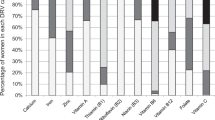Abstract
Micronutrient deficiencies, also known as ‘hidden hunger’, are determining and aggravating factors for health status and quality of life. Three nutritional problems that have serious consequences are deficiencies of iron, vitamin A and iodine. It is estimated that in today's world, iron deficiency anemia affects two billion people, mostly women and children. Blindness due to vitamin A deficiency affects 2.8 million children under 5 years of age. Iodine deficiency disorders affect 740 million people. Cuba is employing various programs to deal with these micronutrient deficiencies. Dietary diversification, fortification of foods and supplementation with pharmaceutical preparations are included in Cuba's response to these deficiencies. Urban agriculture is one strategy to increase dietary diversity. The aim is to increase both the availability and consumption of vegetables and fruits. Food fortification takes many forms in Cuba today and various supplementation programs are carried out. The most common supplemental program in the country is the prenatal program. This program provides four essential nutrients: iron, ascorbic acid, vitamin A and folic acid. At present, iodination covers more than 90% of the total amount of salt used for human consumption. Results of research carried out in Cuba have shown that vitamin A deficiency is nonexistent in children up to 7 y of age. Foods and preparations for these programs are delivered gratuitously or at very low prices.
This is a preview of subscription content, access via your institution
Access options
Subscribe to this journal
Receive 12 print issues and online access
$259.00 per year
only $21.58 per issue
Buy this article
- Purchase on Springer Link
- Instant access to full article PDF
Prices may be subject to local taxes which are calculated during checkout



Similar content being viewed by others
References
World Health Organization (2000): Nutrition for Health and Development: A global agenda for combating malnutrition, Document WHO/NHD/00.6. Geneva: WHO.
Author information
Authors and Affiliations
Contributions
Guarantor: JR Díaz.
Contributors: JRD was responsible for major part of the work (60%), while AC and RR contributed (20% each) to the study.
Corresponding author
Rights and permissions
About this article
Cite this article
Díaz, J., Cagigas, A. & Rodríguez, R. Micronutrient deficiencies in developing and affluent countries. Eur J Clin Nutr 57 (Suppl 1), S70–S72 (2003). https://doi.org/10.1038/sj.ejcn.1601820
Published:
Issue Date:
DOI: https://doi.org/10.1038/sj.ejcn.1601820
Keywords
This article is cited by
-
“Planeterranean” Diet: extending worldwide the health benefits of Mediterranean Diet based on nutritional properties of locally available foods
Journal of Translational Medicine (2022)
-
Divergence in Nutritional Intake and Physical Activity Patterns Among Households in a Village of Ethnic Minorities in Northern Laos at the Initial Stage of Health Transition
Human Ecology (2022)
-
Does socio-economic inequality exist in micro-nutrients supplementation among children aged 6–59 months in India? Evidence from National Family Health Survey 2005–06 and 2015–16
BMC Public Health (2021)
-
Male and undernourished children were at high risk of anemia in Ethiopia: a systematic review and meta-analysis
Italian Journal of Pediatrics (2018)
-
Assessment of genetic variability for grain nutrients from diverse regions: potential for wheat improvement
SpringerPlus (2016)


